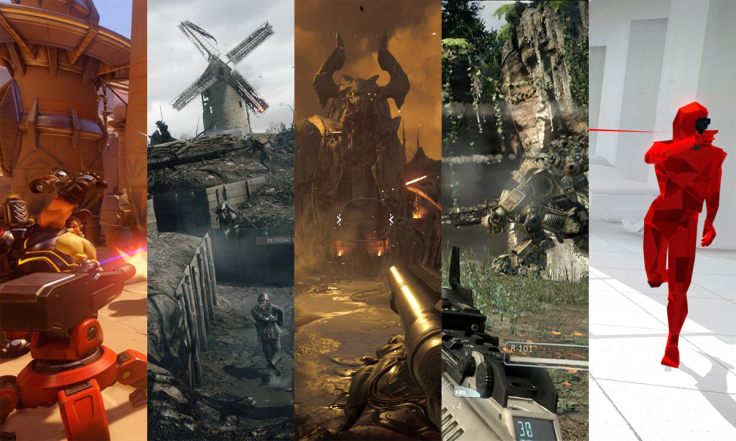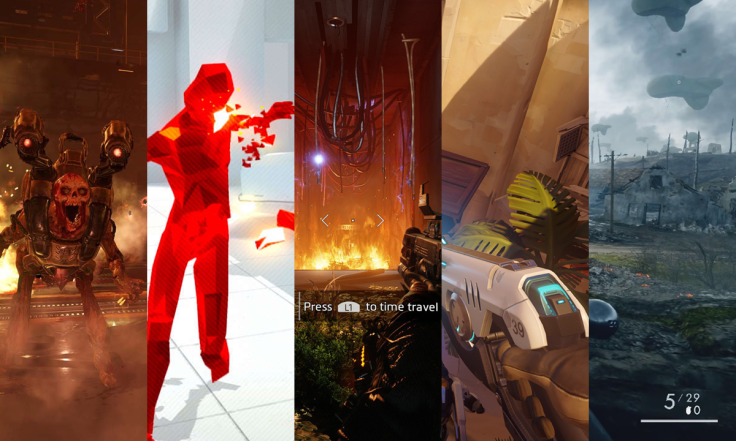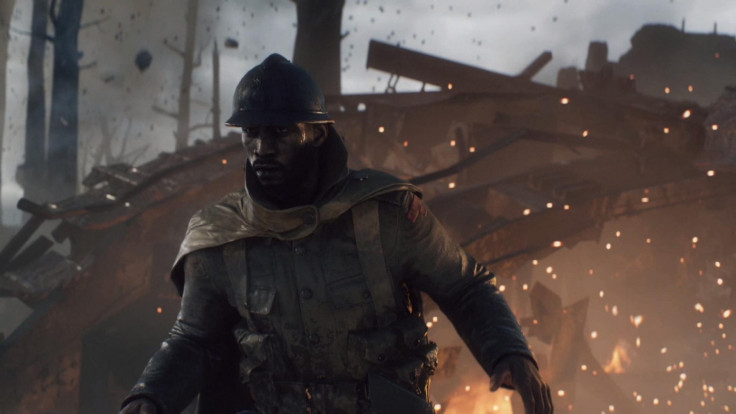Overwatch, Battlefield 1, Doom: Why 2016 was the best ever year for first-person shooters
From Battlefield 1 and Titanfall 2 to Overwatch and Doom - a look at the year's most creative shooters.

First-person shooters are the superhero movies of gaming: they're everywhere, they're incredibly popular and they're not going away any time soon. And while some people may claim to be tired of both, even the most well-worn genres are capable of producing innovative and refreshing offerings.
This year has seen a host of first-person shooters offer a veritable feast of different styles, tones, settings and stories, helping 2016 rank among the greatest ever years for the genre. But has it been the greatest?
What's been most surprising about 2016's array of shooters is how broad their appeal has been and how few have adhered to any kind of conventional template. Some focused on multiplayer over single-player, others did the reverse, some appealed to younger audiences while many skewed older, some included season passes while others didn't include them at all.
The biggest shooter of the year, in terms of impact on the industry, was undoubtedly Overwatch, Blizzard Entertainment's hero-based online shooter.
Overwatch had no single-player story, with the stories of its characters and world fleshed out beyond the game itself, both online and in animated short films. The stories of these characters were adopted and enriched by a fan-base before the game had even been released, making its eventual success all but assured.
This is just one extraordinary aspect of Overwatch, but the narrative only really offers context for the game's action, which blends classic class-based shooter elements with popular multiplayer online battle arena games (MOBAs) like Dota 2.
Like so many of Blizzard's games it is exquisitely-designed and has been incredibly well-supported following launch, and with an ever-growing eSports scene it's clear that Overwatch will be around for years to come.
Overwatch launched in May, shortly after the release of one of the year's biggest surprises. When Bethesda withheld review code for its anticipated reboot/remake of Doom, many were understandably concerned. However, it ended up being one of the year's very best games.
In many ways Doom is the antithesis of Overwatch. Where Blizzard's game skews to a younger audience and focuses on multiplayer, Doom is entirely about its unrelenting, no-nonsense, blood-soaked single-player.
Within three minutes of the game's opening, the player, as the Doom Slayer, has put on their space marine suit and been shown a screen that says "DEMON INVASION IN PROGRESS" and sets out the first basic objective. The head of the facility chimes in, hoping for a working relationship, but Doom Guy shows no interest, throwing the screen to one side.
Doom didn't concern itself with bombarding players with a complex narrative, because it didn't need to. It was unashamedly itself, adhering to its own tone and vision without ever compromising its own vision by imitating its contemporaries.

Perhaps the most unique shooter of the year was Superhot. More often than not, shooters are big-budget, bigger-bang titles – but Superhot was anything but.
Its premise turned the genre on its head to transform the experience of first-person shooting into a puzzle game about geometry and, more than most shooters, planning. What held the game back was an overly-intrusive narrative element that regularly got between player's and this unique gameplay. Had this been handled better, Superhot would have been a classic.
For years shooters have sought to emulate the success of Call of Duty, which has been the genre's poster-child for some time. In the nine years since Call of Duty 4: Modern Warfare came along and turned the series into a blockbusting behemoth it has slowly evolved, but this year's Infinite Warfare took the biggest leap into the unknown yet.
While the exo-suit, wall-running gameplay has been part of the series for two years now (in Advanced Warfare and Black Ops 3), the shift to out-and-out sci-fi was an unexpected development, allowing Infinity Ward to toy with those gameplay elements in new ways.
Not all Call of Duty's fans were happy however, which may be why Activision packaged a full Modern Warfare remaster with certain versions. The remake reviewed well, as did Infinite Warfare's single-player campaign, but the multiplayer was considered lacking – and that hasn't been the case with Call of Duty for a long time.
It was something different, and for that Infinity Ward deserves credit, but it wasn't as vastly different a change as that the series' longest-running rival undertook. DICE's Battlefield series hasn't taken place during a historical conflict since 2010 – when Battlefield 1943 and the Vietnam War-based expansion for Bad Company 2 were released.

For Battlefield 1 the developers went back to World War 1, an unexpected and controversial decision given The Great War's reputation as a particularly pointless and gruesome conflict. Whereas the multiplayer suffered from the tonal clash between presenting the war seriously and creating an entertainment product from it, DICE actually managed to handle the subject matter with a surprising amount of respect in the single player.
War Stories included fivepersonal stories from various places and times during the conflict, and included some of the year's best set pieces, but the game's finest hour is its sombre and affecting opening, which casts players as a succession soldiers in a battle which they and the player will not survive.
Serving as a tutorial, the sequence ends up being Battlefield 1's most poignant, actually saying something about the pointless nature of war, The Great War in particular, and the futility of many situations individual soldiers' face.
It was this single moment that elevated the entire game. In Battlefield's case it set the tone, in the case of Titanfall 2 its single moment of genius provided the cherry on top of one of 2016's greatest surprises.
"Press L1 to time travel."
Effects and Cause, Titanfall 2's fifth mission, takes a little while to set up this spine-tingling prompt, but when the pieces are in place and Respawn Entertainment's towering sequel is ready to show its boldest hand, it's an incredible moment.
The player is handed a device that allows them to time travel within the confines of a ruined facility, using the ability to bypass obstacles and out-manoeuvre enemies. Human security guards inhabit its clean halls in the past, with the planet's dangerous alien wildlife prowling in the present. Coupled with the game's incredible traversal mechanics, it created one of the most memorable sequences in a game this year.
Across the board, first-person shooters in 2016 surprised and compelled audiences, doing so while also standing distinctly apart from their kin. This well-worn genre has been accused, justly, of representing the creatively bankrupt side of gaming –but in 2016 we saw creativity in abundance.
For all the latest video game news follow us on Twitter @IBTGamesUK
© Copyright IBTimes 2025. All rights reserved.



















